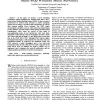Free Online Productivity Tools
i2Speak
i2Symbol
i2OCR
iTex2Img
iWeb2Print
iWeb2Shot
i2Type
iPdf2Split
iPdf2Merge
i2Bopomofo
i2Arabic
i2Style
i2Image
i2PDF
iLatex2Rtf
Sci2ools
VTC
2007
IEEE
2007
IEEE
Efficient Spatial Reuse in Multi-Radio, Multi-Hop Wireless Mesh Networks
— In the paper, we propose a novel scheduling mechanism without modifying the existing IEEE 802.11 MAC, called wireless Radio-Matching Protocol (RMP). It takes account of interferences in wireless mesh networks to achieve maximum spatial reuse by using pre-specified radio transmissions. In contrast with existing random access methods, The RMP adopts decentralized controlled access to avoid nodes from unintentional packet collisions. The RMP adopts a chain topology of bidirectional transmissions, where nodes are spaced so that radios of non-neighboring nodes do not interference with each other. Simulation results indicate that the throughput of RMP is about 30% better than that of Ripple [7] and almost 200% better than that of the IEEE 802.11 DCF. Although RMP achieves higher throughput than Ripple, it still maintains the same delay time and transmission quality, as verified by our simulation results. The RMP achieved a stable throughput and a low end-to-end transmission delay in both...
IEEE 802.11 | Ieee 802.11 Dcf | RMP Adopts | VTC 2007 |
| Added | 04 Jun 2010 |
| Updated | 04 Jun 2010 |
| Type | Conference |
| Year | 2007 |
| Where | VTC |
| Authors | Da-Ren Guo, Kuochen Wang, Lung-Sheng Lee |
Comments (0)

